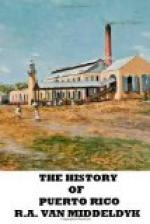The incessant communications to the emperor, and even to the empress, on every subject more or less connected with the public service, but dictated mostly by considerations of self-interest, coming, as they did, from the smallest and poorest and least important of his Majesty’s possessions, must have been a source of great annoyance to the imperial ministers, consequently they resolved to remove the cause. The Admiral was deprived of the prerogative of appointing governors, and henceforth the alcaldes (mayors) and “chief alguaciles” (high constables), to be elected from among the colonists by a body of eight aldermen (regidores), were to exercise the governmental functions for one year at a time, and could not be reelected till two years after the first nomination. The wisdom of this innovation was not generally acknowledged. The crown officers wrote: " ... All are not agreed on the point whether the governor should or should not be elected among the residents of the island. For the country’s good he should, no doubt, be a resident.”
Alonzo la Fuente was of a different opinion. He wrote in November, 1536: “It has been a great boon to take the appointment of governors out of the Admiral’s hands. As a rule, some neighbor or friend was made supreme judge, and he usually proceeded with but little regard for the island’s welfare. All the rest were servants and employees of the Admiral, which caused me much uneasiness, seeing the results. Appoint a governor, but a man from abroad, not a resident.” In the following year he wrote regarding the elective system just introduced: " ... If the alcaldes must take cognizance of everything, this will become a place of confusion and disorder. A few will lord it over all the rest, and the alcaldes themselves will but be their creatures.”
The new system of government was unsatisfactory. Castro and Castellanos asked for the appointment of a supreme judge in March, 1539, because an appeal to the authorities in la Espanola was made against every decision of the alcalde. Alderman La Fuente and Martel confirmed this in December, 1541. They wrote: " ... There is great want of a supreme judge. More than fifteen homicides have been committed in less than eight years, and only one of the delinquents has been punished ...” In January, 1542, the city officers sent a deputy to lay their grievances before the emperor, not daring to write them “for their lives,” and in February the island’s attorney, Alonzo Molina, stated the causes of the failure of the elective system to be the ignorance of the laws of those in authority and the reduced number of electors. “It is necessary,” he said, “to name a mayor or governor who is a man of education and conscience, not a resident, because the judges have their ’compadres.’[35] The governor must be a man of whom they stand in fear, and if some one of this class is not sent soon, he will find few to govern, for the majority intend to abandon the island.”




